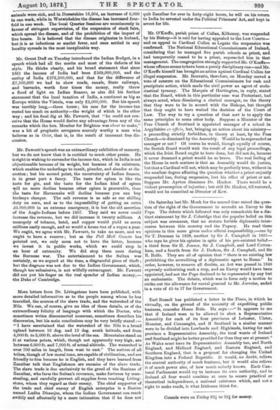Mr. Fawcett's speech was an extraordinary exhibition of memory, but
we do not know that it is entitled to mach other praise. He is right in wishing to surrender the income-tax, which in India is not -objectionable because of its weight, but because of its existence, which enables the underlings to insult, plunder, and slander at dig. uretion ; but his second point, the uncertainty of Indian finance, is in great part a fancy. The taste for opium is like the taste for gin, and the taste for the Indian kind of opium will no more decline because other opium is procurable, than the taste for Havannahs will decline because you can buy birdseye cheaper. The salt revenue is as safe as our shilling 'duty on corn, and as to the impossibility of getting an extra £5,000,000 in an extreme emergency, it is but the old assertion of the Anglo-Indians before 1857. They said we never could increase the revenue, but we did increase it twenty millions. A monopoly of tobacco, betel, and copper would yield us seven 'millions easily enough, and so would a house-tax of a rupee a year. We ought, we agree with Mr. Fawcett, to take no more, and we -ought to have a reserve ; but as the Pall Mall Gazette has pointed out, we only seem not to have the latter, because we invest it in public works, which we could stop in an hour of extremity. We did stop them once during the Burmese war. The entertainment to the Sultan was -certainly, as we argued at the time, a disgraceful piece of theft ; but the disgrace was not due to the Indian Government, which, though too submissive, is not wilfully extravagant. Mr. Fawcett
• did not put his finger on the real spender of Indian money,— the Duke of Cambridge.
































 Previous page
Previous page